冀教版八年级下册Unit 8 Save Our World Lesson 43 Let's Clean Up!课件(共35张PPT)
文档属性
| 名称 | 冀教版八年级下册Unit 8 Save Our World Lesson 43 Let's Clean Up!课件(共35张PPT) |
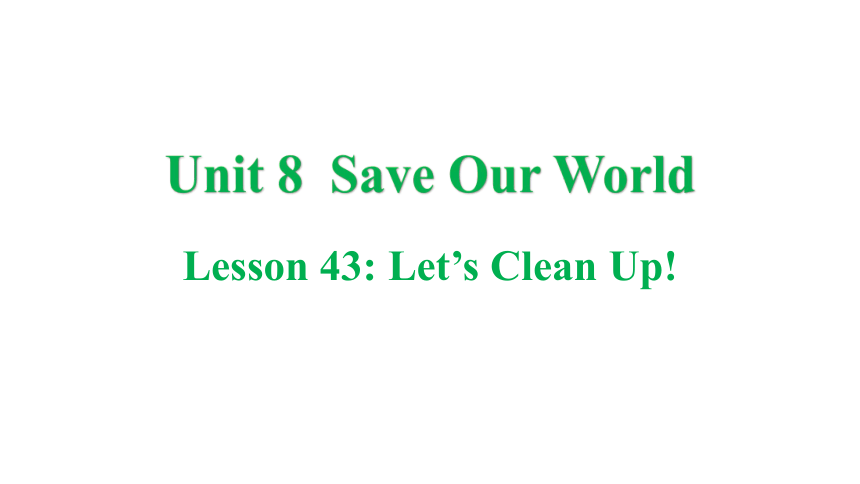
|
|
| 格式 | pptx | ||
| 文件大小 | 531.0KB | ||
| 资源类型 | 教案 | ||
| 版本资源 | 冀教版 | ||
| 科目 | 英语 | ||
| 更新时间 | 2024-05-02 18:31:11 | ||
图片预览

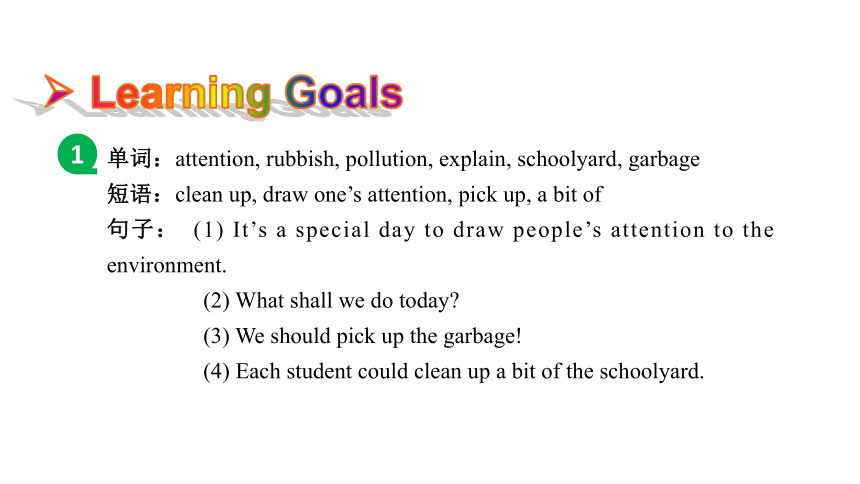
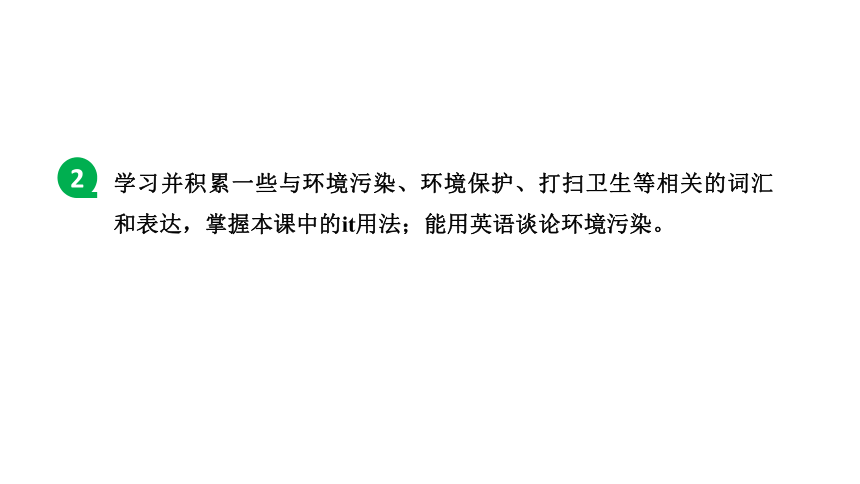
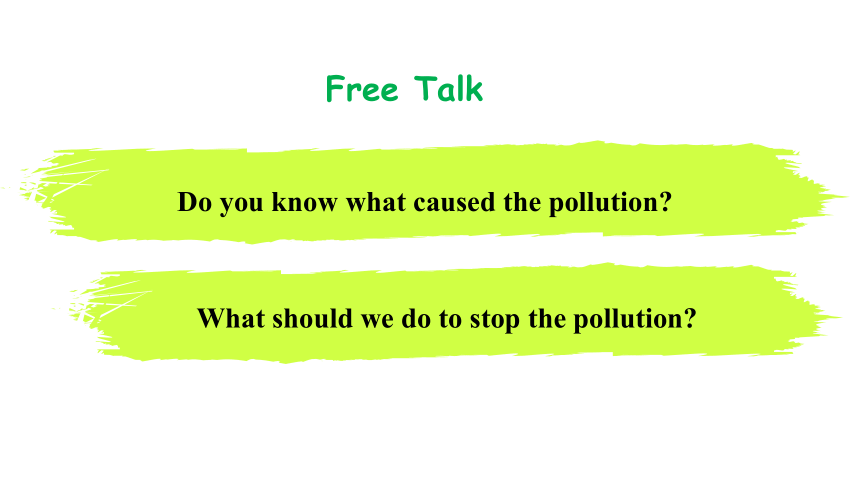
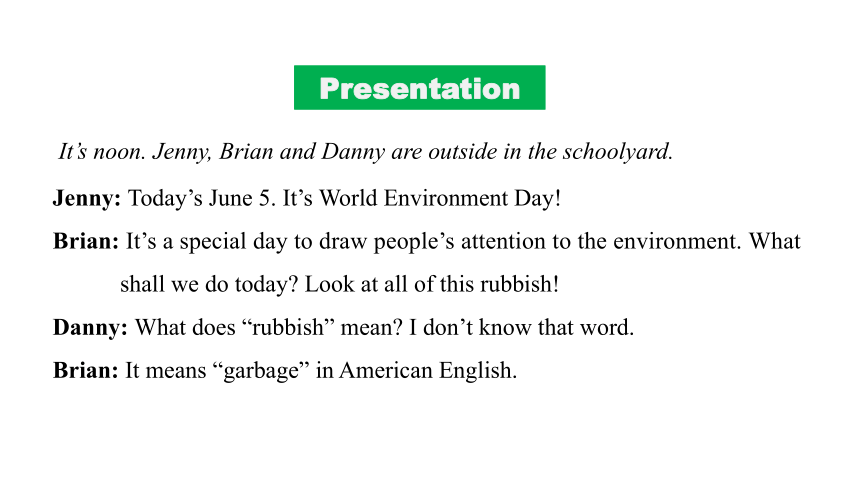
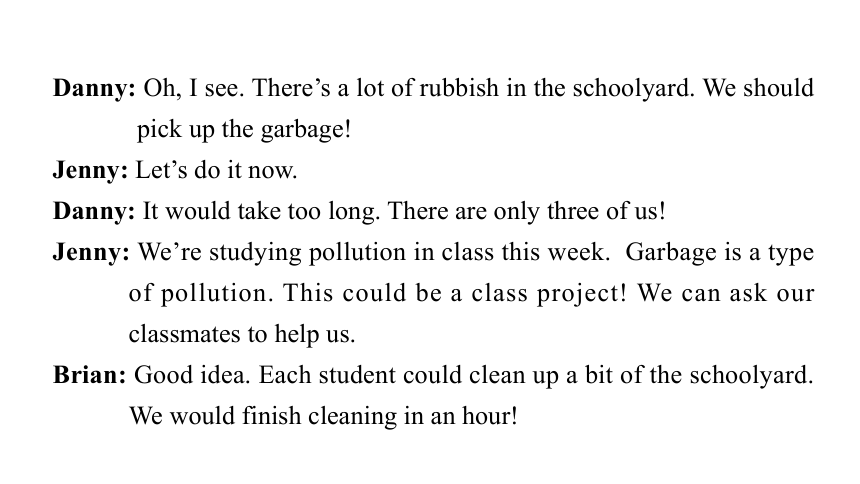
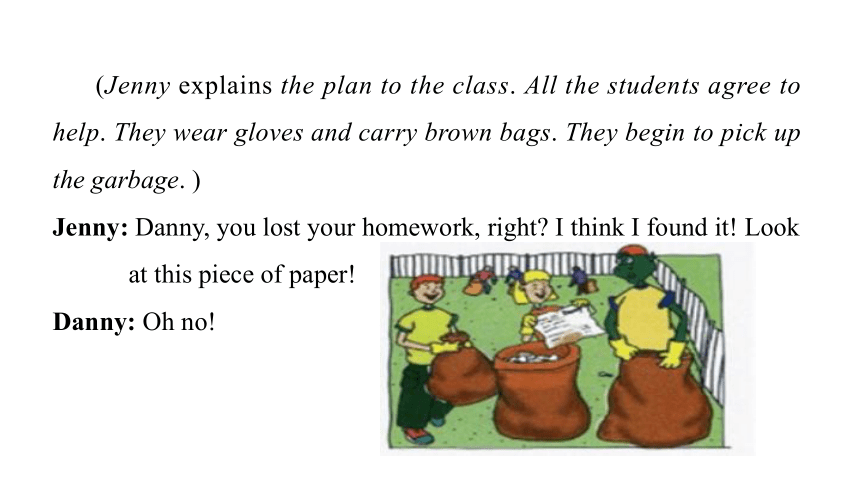

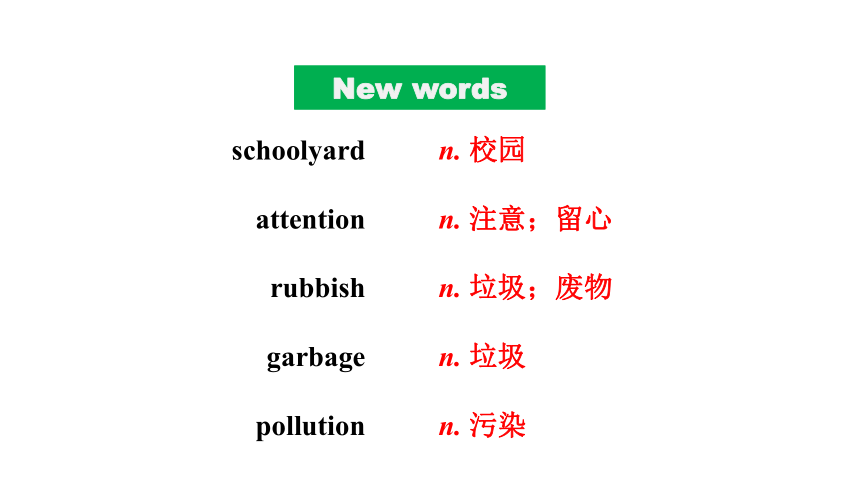

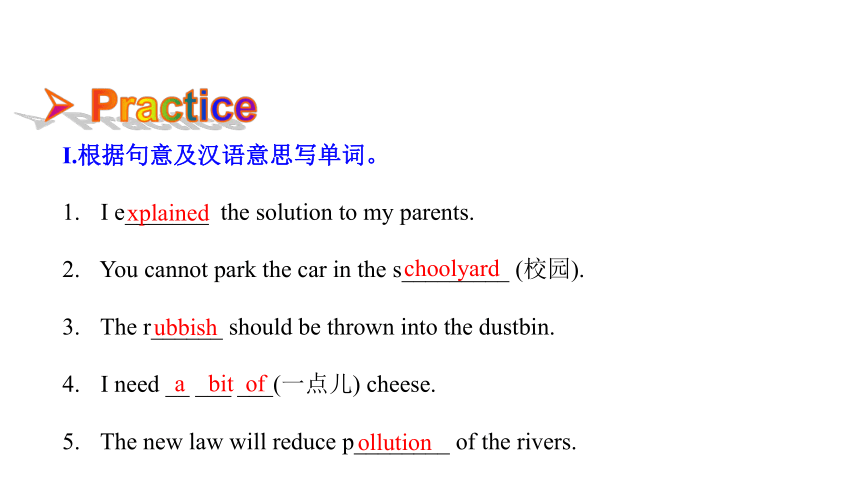
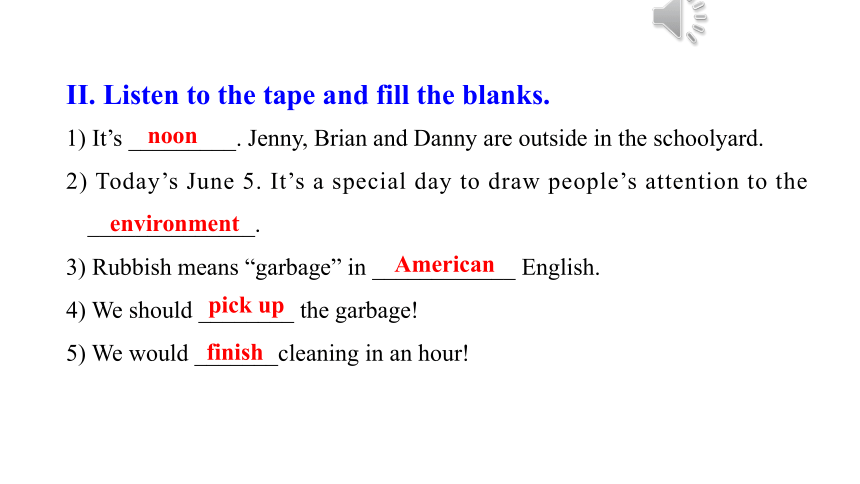
文档简介
(共35张PPT)
Lesson 43: Let’s Clean Up!
Unit 8 Save Our World
单词:attention, rubbish, pollution, explain, schoolyard, garbage
短语:clean up, draw one’s attention, pick up, a bit of
句子: (1) It’s a special day to draw people’s attention to the environment.
(2) What shall we do today
(3) We should pick up the garbage!
(4) Each student could clean up a bit of the schoolyard.
Learning Goals
1
学习并积累一些与环境污染、环境保护、打扫卫生等相关的词汇和表达,掌握本课中的it用法;能用英语谈论环境污染。
2
Free Talk
Do you know what caused the pollution
What should we do to stop the pollution
Presentation
It’s noon. Jenny, Brian and Danny are outside in the schoolyard.
Jenny: Today’s June 5. It’s World Environment Day!
Brian: It’s a special day to draw people’s attention to the environment. What shall we do today Look at all of this rubbish!
Danny: What does “rubbish” mean I don’t know that word.
Brian: It means “garbage” in American English.
Danny: Oh, I see. There’s a lot of rubbish in the schoolyard. We should pick up the garbage!
Jenny: Let’s do it now.
Danny: It would take too long. There are only three of us!
Jenny: We’re studying pollution in class this week. Garbage is a type of pollution. This could be a class project! We can ask our classmates to help us.
Brian: Good idea. Each student could clean up a bit of the schoolyard. We would finish cleaning in an hour!
(Jenny explains the plan to the class. All the students agree to help. They wear gloves and carry brown bags. They begin to pick up the garbage. )
Jenny: Danny, you lost your homework, right I think I found it! Look at this piece of paper!
Danny: Oh no!
Learning Tip
World Environment Day began in 1972. It’s organized by the U.N. every year in different countries. Its aim is to remind people to protect the environment.
New words
schoolyard
attention
rubbish
garbage
pollution
n. 校园
n. 注意;留心
n. 垃圾;废物
n. 垃圾
n. 污染
explain
clean up
draw one’s attention
pick up
a bit of
v. 解释
打扫;把……打扫干净
引起……的注意
拣起;拿起
一点儿
I e_______ the solution to my parents.
You cannot park the car in the s_________ (校园).
The r______ should be thrown into the dustbin.
I need __ ___ ___(一点儿) cheese.
The new law will reduce p________ of the rivers.
xplained
choolyard
ubbish
a
bit
of
ollution
I.根据句意及汉语意思写单词。
Practice
II. Listen to the tape and fill the blanks.
1) It’s _________. Jenny, Brian and Danny are outside in the schoolyard.
2) Today’s June 5. It’s a special day to draw people’s attention to the ______________.
3) Rubbish means “garbage” in ____________ English.
4) We should ________ the garbage!
5) We would _______cleaning in an hour!
noon
environment
American
pick up
finish
Let's do it!
1. Read the lesson and write true (T) or false (F).
1. Jenny, Brian and Danny are going to do something on World
Environment Day. ( )
2. They are studying geography this week. ( )
3. They are going to pick up the garbage on the street. ( )
4. Jenny found Danny's homework. ( )
T
F
F
T
Jeff: Look at the sky! It's always grey. We can't even see the sky clearly.
Marina: If this goes on, the birds will fly away and never come back.
Jeff: Our river used to be very clean. But now look at the water! There is too much __________ left by the factories.
pollution rubbish schoolyard agree clean attention
rubbish
3. Complete the dialogue with the correct forms of the words in the box.
Let's do it!
Marina: If this goes on, the fish will die. People should do something to stop the __________.
Jeff: I ________. Let’s do something to draw people’s ___________ to this problem. How about putting up a poster
Marina: Good idea. Jeff, I think our _________ is also quite dirty. Let’s call our classmates to help clean it before the new term starts.
Jeff: OK. We would finish ________ in an hour!
pollution
agree
attention
schoolyard
cleaning
Language points
1. It’s a special day to draw people’s attention to the environment. 这是引起人们关注环境的一个特殊日子。
draw / catch one’s attention (to)意为“吸引……的注意力(到……上)”。其中to是介词,后面跟名词、代词或动名词作宾语。
※ The teacher drew our attention to listening to her.
老师把我们的注意力引到了听讲上。
常用短语:
pay attention to 注意
draw one’s attention 引起某人的注意
attract one’s attention 吸引某人的注意
give attention to 注意
2. Look at all of this rubbish!看看这所有的垃圾吧!
rubbish n.垃圾;废物。它是不可数名词,其同义词有litter,garbage。
※ Don’t throw the rubbish about!
不要乱扔垃圾!
3. We should pick up the garbage!我们应该把垃圾捡起来!
pick up意为“捡起;拾起”,是动副型短语,接代词作宾语时,代词必须放在pick和up的中间。
※ A waste bag is on the floor. Please pick it up.
地板上有一个废袋子。请把它捡起来。
拓展:pick up还可译为“(用车)接……,(偶然)学会……”。
※ Linda, I’ll pick you up after school.
琳达,放学后我开车去接你。
4. We’re studying pollution in class this week. 这周我们在课堂上学习污染。
pollution n.污染。不可数名词
light pollution 光污染
air pollution 空气污染
pollute v.污染。常用于pollute sth. with / by sth.结构中。
※ We should not pollute our rivers with waste.
我们不应该用废弃物污染我们的河流。
5. Garbage is a type of pollution. 垃圾是一种污染。
a type of意为“一种……”,它相当于a kind of / a sort of。当表示“几种……”时,可将a换成基数词,type要用复数形式。
※ This is a type of rare blood.
这是一种罕见的血型。
6. Each student could clean up a bit of the schoolyard. 每个学生可以打扫一小块儿校园。
(1)clean up意为“清理,打扫”,为动副型短语。代词作宾语时,要放在clean与up之间。
※ Your bedroom is so dirty. Please clean it up.
你的卧室太脏了。请打扫一下。
(2)a bit of意为“一点儿,一些”,修饰不可数名词。a bit意为“有点儿”,修饰形容词或副词。
※ With a bit of luck, we’ll be there by 12.
如果顺利点儿,我们将于12点钟赶到那里。
※ Will you please turn down the radio a bit
请你把收音机音量开小一点儿好吗?
※ She’s a bit afraid of the teacher.
她有点儿怕老师。
7. We would finish cleaning in an hour!一小时之后,我们就会打扫完!
finish doing sth.意为“做完某事”。在该短语中,动名词作finish的宾语。
※ Have you finished reading the storybook
你读完这本故事书了吗?
8. Jenny explains the plan to the class. 詹妮把这个计划解释给全班同学。
explain v. 解释
常用结构:
explain sth. to sb. 向某人解释某事
explain +从句:解释……
explain oneself 把自己的意思表达清楚
※ We explained our plan to the committee.
我们向委员会解释了我们的计划。
※ I explained that I missed the bus.
我解释说我错过了那班公共汽车。
※ Could you explain yourself, please
请把你的意思表达清楚,好吗
9. All the students agree to help.所有学生都同意帮忙。
agree to do sth. 同意做某事
agree的其他用法:
① agree with sb.表示“同意某人(的看法)”。
② agree on sth.主要指双方通过协商而取得一致意见或达成协议。
※ They agreed to give it to me the next day.
他们同意第二天把它给我。
※ I quite agree with you.
我完全同意你(的看法)。
※ Can we agree on a date
我们能约定一个日期吗
Practice
1. Have you finish _______ (read) the book
2. We should _______ (pick) up the garbage over there.
3. You’d better _________ (not throw) rubbish about.
4. It’s good _______ (keep)our classroom and school yard clean.
I.用所给词的适当形式填空
reading
pick
not throw
to keep
Ⅱ.完成句子。
1. She saw a piece of paper and ________ ________ _______(把它捡起来).
2. He was thirsty, but there was only________ ________ _______(一点儿)water.
3. The beautiful flower________ ________ _________(吸引了我的注意).
4. She wants to ask the teacher to _______ ________ __________(为我解释一下)what it means.
picked it up
a bit of
drew my attention
explain to me
Let's do it!
1. Where are they talking
A. In the market. B. In the schoolyard.
2. What are they talking about
A. Picking up garbage. B. Playing soccer.
3. What is the class project about
A. Environment. B. Pollution.
2. Listen to the dialogue and tick the correct answers.
√
√
√
A: It’s a cool day, Li Ming. Let’s play soccer in the schoolyard.
B: But look at all of this garbage! We should pick up the garbage first.
A: That’s too much work! Let’s find others to help us.
B: Our classmates can help us. We can make it a class project about pollution this week.
A: Good idea! We would finish cleaning in an hour!
Listening Material
Sum up
1. The new words:
attention, rubbish, pollution, explain, schoolyard, garbage
2. Important phrases:
clean up, draw one’s attention, pick up, a bit of
3. Important sentences:
(1) It’s a special day to draw people’s attention to the environment.
(2) What shall we do today
(3) We should pick up the garbage!
(4) Each student could clean up a bit of the schoolyard.
Homework
1. Remember the new words and expressions learnt in this lesson.
2. Preview Lesson 44.
Lesson 43: Let’s Clean Up!
Unit 8 Save Our World
单词:attention, rubbish, pollution, explain, schoolyard, garbage
短语:clean up, draw one’s attention, pick up, a bit of
句子: (1) It’s a special day to draw people’s attention to the environment.
(2) What shall we do today
(3) We should pick up the garbage!
(4) Each student could clean up a bit of the schoolyard.
Learning Goals
1
学习并积累一些与环境污染、环境保护、打扫卫生等相关的词汇和表达,掌握本课中的it用法;能用英语谈论环境污染。
2
Free Talk
Do you know what caused the pollution
What should we do to stop the pollution
Presentation
It’s noon. Jenny, Brian and Danny are outside in the schoolyard.
Jenny: Today’s June 5. It’s World Environment Day!
Brian: It’s a special day to draw people’s attention to the environment. What shall we do today Look at all of this rubbish!
Danny: What does “rubbish” mean I don’t know that word.
Brian: It means “garbage” in American English.
Danny: Oh, I see. There’s a lot of rubbish in the schoolyard. We should pick up the garbage!
Jenny: Let’s do it now.
Danny: It would take too long. There are only three of us!
Jenny: We’re studying pollution in class this week. Garbage is a type of pollution. This could be a class project! We can ask our classmates to help us.
Brian: Good idea. Each student could clean up a bit of the schoolyard. We would finish cleaning in an hour!
(Jenny explains the plan to the class. All the students agree to help. They wear gloves and carry brown bags. They begin to pick up the garbage. )
Jenny: Danny, you lost your homework, right I think I found it! Look at this piece of paper!
Danny: Oh no!
Learning Tip
World Environment Day began in 1972. It’s organized by the U.N. every year in different countries. Its aim is to remind people to protect the environment.
New words
schoolyard
attention
rubbish
garbage
pollution
n. 校园
n. 注意;留心
n. 垃圾;废物
n. 垃圾
n. 污染
explain
clean up
draw one’s attention
pick up
a bit of
v. 解释
打扫;把……打扫干净
引起……的注意
拣起;拿起
一点儿
I e_______ the solution to my parents.
You cannot park the car in the s_________ (校园).
The r______ should be thrown into the dustbin.
I need __ ___ ___(一点儿) cheese.
The new law will reduce p________ of the rivers.
xplained
choolyard
ubbish
a
bit
of
ollution
I.根据句意及汉语意思写单词。
Practice
II. Listen to the tape and fill the blanks.
1) It’s _________. Jenny, Brian and Danny are outside in the schoolyard.
2) Today’s June 5. It’s a special day to draw people’s attention to the ______________.
3) Rubbish means “garbage” in ____________ English.
4) We should ________ the garbage!
5) We would _______cleaning in an hour!
noon
environment
American
pick up
finish
Let's do it!
1. Read the lesson and write true (T) or false (F).
1. Jenny, Brian and Danny are going to do something on World
Environment Day. ( )
2. They are studying geography this week. ( )
3. They are going to pick up the garbage on the street. ( )
4. Jenny found Danny's homework. ( )
T
F
F
T
Jeff: Look at the sky! It's always grey. We can't even see the sky clearly.
Marina: If this goes on, the birds will fly away and never come back.
Jeff: Our river used to be very clean. But now look at the water! There is too much __________ left by the factories.
pollution rubbish schoolyard agree clean attention
rubbish
3. Complete the dialogue with the correct forms of the words in the box.
Let's do it!
Marina: If this goes on, the fish will die. People should do something to stop the __________.
Jeff: I ________. Let’s do something to draw people’s ___________ to this problem. How about putting up a poster
Marina: Good idea. Jeff, I think our _________ is also quite dirty. Let’s call our classmates to help clean it before the new term starts.
Jeff: OK. We would finish ________ in an hour!
pollution
agree
attention
schoolyard
cleaning
Language points
1. It’s a special day to draw people’s attention to the environment. 这是引起人们关注环境的一个特殊日子。
draw / catch one’s attention (to)意为“吸引……的注意力(到……上)”。其中to是介词,后面跟名词、代词或动名词作宾语。
※ The teacher drew our attention to listening to her.
老师把我们的注意力引到了听讲上。
常用短语:
pay attention to 注意
draw one’s attention 引起某人的注意
attract one’s attention 吸引某人的注意
give attention to 注意
2. Look at all of this rubbish!看看这所有的垃圾吧!
rubbish n.垃圾;废物。它是不可数名词,其同义词有litter,garbage。
※ Don’t throw the rubbish about!
不要乱扔垃圾!
3. We should pick up the garbage!我们应该把垃圾捡起来!
pick up意为“捡起;拾起”,是动副型短语,接代词作宾语时,代词必须放在pick和up的中间。
※ A waste bag is on the floor. Please pick it up.
地板上有一个废袋子。请把它捡起来。
拓展:pick up还可译为“(用车)接……,(偶然)学会……”。
※ Linda, I’ll pick you up after school.
琳达,放学后我开车去接你。
4. We’re studying pollution in class this week. 这周我们在课堂上学习污染。
pollution n.污染。不可数名词
light pollution 光污染
air pollution 空气污染
pollute v.污染。常用于pollute sth. with / by sth.结构中。
※ We should not pollute our rivers with waste.
我们不应该用废弃物污染我们的河流。
5. Garbage is a type of pollution. 垃圾是一种污染。
a type of意为“一种……”,它相当于a kind of / a sort of。当表示“几种……”时,可将a换成基数词,type要用复数形式。
※ This is a type of rare blood.
这是一种罕见的血型。
6. Each student could clean up a bit of the schoolyard. 每个学生可以打扫一小块儿校园。
(1)clean up意为“清理,打扫”,为动副型短语。代词作宾语时,要放在clean与up之间。
※ Your bedroom is so dirty. Please clean it up.
你的卧室太脏了。请打扫一下。
(2)a bit of意为“一点儿,一些”,修饰不可数名词。a bit意为“有点儿”,修饰形容词或副词。
※ With a bit of luck, we’ll be there by 12.
如果顺利点儿,我们将于12点钟赶到那里。
※ Will you please turn down the radio a bit
请你把收音机音量开小一点儿好吗?
※ She’s a bit afraid of the teacher.
她有点儿怕老师。
7. We would finish cleaning in an hour!一小时之后,我们就会打扫完!
finish doing sth.意为“做完某事”。在该短语中,动名词作finish的宾语。
※ Have you finished reading the storybook
你读完这本故事书了吗?
8. Jenny explains the plan to the class. 詹妮把这个计划解释给全班同学。
explain v. 解释
常用结构:
explain sth. to sb. 向某人解释某事
explain +从句:解释……
explain oneself 把自己的意思表达清楚
※ We explained our plan to the committee.
我们向委员会解释了我们的计划。
※ I explained that I missed the bus.
我解释说我错过了那班公共汽车。
※ Could you explain yourself, please
请把你的意思表达清楚,好吗
9. All the students agree to help.所有学生都同意帮忙。
agree to do sth. 同意做某事
agree的其他用法:
① agree with sb.表示“同意某人(的看法)”。
② agree on sth.主要指双方通过协商而取得一致意见或达成协议。
※ They agreed to give it to me the next day.
他们同意第二天把它给我。
※ I quite agree with you.
我完全同意你(的看法)。
※ Can we agree on a date
我们能约定一个日期吗
Practice
1. Have you finish _______ (read) the book
2. We should _______ (pick) up the garbage over there.
3. You’d better _________ (not throw) rubbish about.
4. It’s good _______ (keep)our classroom and school yard clean.
I.用所给词的适当形式填空
reading
pick
not throw
to keep
Ⅱ.完成句子。
1. She saw a piece of paper and ________ ________ _______(把它捡起来).
2. He was thirsty, but there was only________ ________ _______(一点儿)water.
3. The beautiful flower________ ________ _________(吸引了我的注意).
4. She wants to ask the teacher to _______ ________ __________(为我解释一下)what it means.
picked it up
a bit of
drew my attention
explain to me
Let's do it!
1. Where are they talking
A. In the market. B. In the schoolyard.
2. What are they talking about
A. Picking up garbage. B. Playing soccer.
3. What is the class project about
A. Environment. B. Pollution.
2. Listen to the dialogue and tick the correct answers.
√
√
√
A: It’s a cool day, Li Ming. Let’s play soccer in the schoolyard.
B: But look at all of this garbage! We should pick up the garbage first.
A: That’s too much work! Let’s find others to help us.
B: Our classmates can help us. We can make it a class project about pollution this week.
A: Good idea! We would finish cleaning in an hour!
Listening Material
Sum up
1. The new words:
attention, rubbish, pollution, explain, schoolyard, garbage
2. Important phrases:
clean up, draw one’s attention, pick up, a bit of
3. Important sentences:
(1) It’s a special day to draw people’s attention to the environment.
(2) What shall we do today
(3) We should pick up the garbage!
(4) Each student could clean up a bit of the schoolyard.
Homework
1. Remember the new words and expressions learnt in this lesson.
2. Preview Lesson 44.
同课章节目录
- Unit 1 Spring Is Coming
- Lesson 1 How's the weather?
- Lesson 2 It's Getting Warmer!
- Lesson 3 Sun Is Rising
- Lesson 4 The Spring City
- Lesson 5 Babysitting on a Spring Day
- Lesson 6 Stories about Spring
- Unit 2 Plant a Plant
- Lesson 7 Planting Trees
- Lesson 8 Why Are Plants Important?
- Lesson 9 Gardening with Mary
- Lesson 10 Make Your Garden Grow!
- Lesson 11 Amazing Plants
- Lesson 12 Danny's Plant
- Unit 3 Animals Are Our Friends
- Lesson 13 Danny's Big Scare
- Lesson 14 Amazing Animals
- Lesson 15 The Zoo Is Open
- Lesson 16 The Pear Escaped
- Lesson 17 Save the Tigers
- Lesson 18 Friendship Between Animals
- Unit 4 The Internet Connects Us
- Lesson 19 How Do You Use the Internet?
- Lesson 20 A Computer Helps!
- Lesson 21 Books or Computers?
- Lesson 22 Travel on the Internet
- Lesson 23 The Internet--Good or Bad?
- Lesson 24 An E-mail to Grandpa
- Unit 5 Buying and Selling
- Lesson 25 Raising Money
- Lesson 26 Cookies, Please!
- Lesson 27 Business English
- Lesson 28 Ms. Liu's Great Idea
- Lesson 29 How to Push a Product
- Lesson 30 A Cookie Sale
- Unit 6 Be a Champion!
- Lesson 31 Don't Fall, Danny
- Lesson 32 My Favourite Record
- Lesson 33 2800 Years of Sports
- Lesson 34 Modern Olympics
- Lesson 35 The Dream Team
- Lesson 36 Classroom Olympics
- Unit 7 Know Our World
- Lesson 37 Let's Learn Geography!
- Lesson 38 The World Is a Big Place
- Lesson 39 Ring Up or Call?
- Lesson 40 Body Language
- Lesson 41 A Class of the World
- Lesson 42 North America
- Unit 8 Save Our World
- Lesson 43 Let's Clean Up!
- Lesson 44 Environment Clubs
- Lesson 45 Let's Sort Garbage!
- Lesson 46 Protect Our Environment
- Lesson 47 Connected to Nature
- Lesson 48 Garbage Is Interesting!
